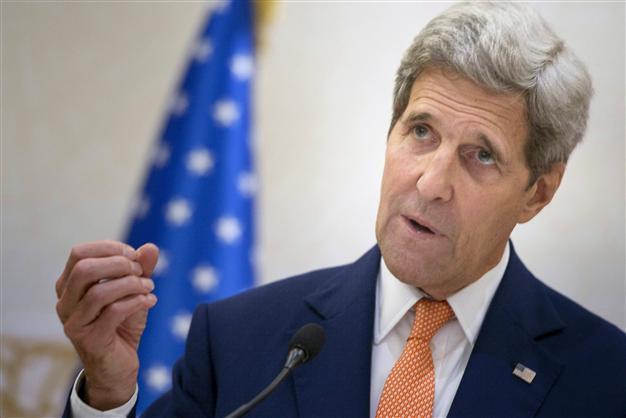US to speed up arms sales to Gulf after Iran deal: Kerry
DOHA - Agence France-Presse

U.S. Secretary of State John Kerry speaks during a news conference following a meeting with foreign ministers of the Gulf Cooperation Council (GCC) in Doha, Qatar August 3, 2015. Reuters Photo
Washington has agreed to speed up arms sales to Gulf states, US Secretary of State John Kerry announced on August 3 after talks in Doha on their concerns over the Iran nuclear deal.At the same time, his Qatari counterpart, Khalid bin Mohammad Al-Attiyah, told a joint press conference with Kerry that the nuclear deal was "the best option among other options".
Asked what he could offer Gulf states, Kerry said the United States "agreed to expedite certain arms sales that are needed and that have taken too long in the past".
The US would also step up efforts to share intelligence and increase the number of joint military exercises with its Arab allies, Kerry said following talks with foreign ministers of the six-nation Gulf Cooperation Council.
He travelled to the Qatari capital for meetings with the Sunni monarchies of the GCC in a bid to calm their fears over the nuclear accord with Shiite Iran.
The GCC groups Qatar with Bahrain, Kuwait, Oman, Saudi Arabia and the United Arab Emirates.
Gulf countries have expressed concerns that the July 14 deal between Iran and world powers would allow greater regional interference by the Islamic republic.
"We talked about the possibility, not the possibility, the reality of increasing the number of exercises that we are conducting together," Kerry said.
"These are a few examples and ways in which we believe the security of the region can be strengthened and cooperation will be enhanced."
Kerry added that there was also agreement to "talk about how to integrate the region's ballistic missile defences based on some of the activities of other countries".
Attiyah said there was support for the nuclear deal among countries in the Gulf, despite their cautious reaction.
"This was the best option among other options to come up with a solution to the nuclear weapons of Iran through dialogue and this came up as a result of the efforts exerted by the United States of America and its allies," the Qatari minister said, speaking in Arabic.
Attiyah also called for a ban on all nuclear weapons not only in Iran but "all the Middle East".
As well as his talks with Attiyah, Kerry also met Saudi Arabia's foreign minister, Adel bin Ahmed al-Jubeir, and Qatar's emir, Tamim bin Hamad Al-Thani.
Before leaving Qatar late August 3, Kerry also held a three-way meeting with Russian Foreign Minister Sergei Lavrov and Jubeir, with discussions expected to centre on Syria.
However, those talks may not have been so convivial.
Afterwards, Lavrov told reporters that an announced US willingness to take extra measures to defend allied fighters in Syria was "counter-productive".
In a Doha news conference alongside Attiyah, Lavrov said: "We believe it's counterproductive to announce publicly that some US-trained armed groups... will be under the protection of the coalition's air forces," Lavrov said.
"And that to protect these groups this air force would be authorised to strike at any forces which may -- may -- be considered a hindrance to the work of this group."
Lavrov said the matter had been raised with Kerry in the meeting.
Russia's top diplomat was responding to remarks from White House spokesman Josh Earnest who said Syria "should not interfere" with operations by US-trained forces, warning that "additional steps" could be taken to defend them, raising the prospect of strikes against the regime.
Kerry flew to Qatar on Sunday from Egypt, where he also sought to assure Cairo that the landmark Iran deal signed in Vienna would bring greater security to the Middle East.
He said Washington recognised that "Iran is engaged in destabilising activities in the region -- and that is why it is so important to ensure that Iran's nuclear programme remains wholly peaceful".
"If Iran is destabilising, it is far, far better to have an Iran that doesn't have a nuclear weapon than one that does," he said.
















